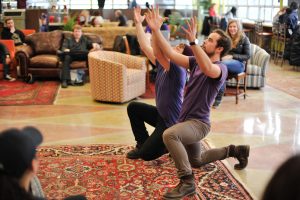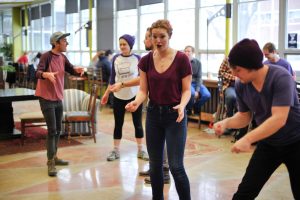Peanut Butter and Hot New Jam
CWU’s improv troupe, Hot New Jam, stretches its imagination to create unique scenes
April 6, 2017
 Creating a scene without a prompt may seem daunting to the average student, but to the members of the Hot New Jam, flying by the seat of their pants is nothing new. The Hot New Jam (HNJ) is CWU’s student-lead improv troupe. Improv—or improvisation—is the art of creating a scene from nothing more than a given prompt, no scripts involved.
Creating a scene without a prompt may seem daunting to the average student, but to the members of the Hot New Jam, flying by the seat of their pants is nothing new. The Hot New Jam (HNJ) is CWU’s student-lead improv troupe. Improv—or improvisation—is the art of creating a scene from nothing more than a given prompt, no scripts involved.
According to their Facebook page, the group was formed in January 2013. Chelsey Sheppard is a third-year BFA Candidate of theatre performance and is one of the team members of HNJ.
“This club has actually been around since before either of us got here. We were both put on the team last year,” Sheppard said.
Club President Deven Austin, a theatre performance BFA Candidate, runs the group with the help of other team members like Sheppard.
Austin stated that there is an audition process to joining the group, but said that it didn’t stop him when he wanted to join. At the time he wasn’t in any of the theatre productions and he had some background in improv during high school which influenced his decision to audition.
“I got on the team and I have been doing it ever since,” Austin said.
Both Austin and Sheppard heard about HNJ through the theatre department, which according to Sheppard, hosts different activities for its students. The two of them and the rest of the members of HNJ are working to get the group more recognition throughout campus so people outside of the theatre department get to know them.
“We are branching out,” Austin said. “We have performances every other Friday in the [1891] Bistro and we are in the process of making our own radio show, an hour long audio-only radio show on 88.1 The ‘Burg.”
In addition to performing at the bistro, HNJ also holds both open and closed practices every Friday in Hertz 122 at 4 p.m.
The closed practices are for official members of HNJ. These members, all of whom are in the theatre department, work together to hone their skills and prepare for their time on the stage. In order to become an official member, one must go to the auditions at the beginning of every quarter for a chance to fill any openings on the team.
According to Sheppard, before the auditions the current team members discuss what they are looking for in a new teammate, then the auditions are held to fill any gaps in the group. Sheppard said that they prefer to have eight people as their standard improv team.
For those who are not members, there are always the open practices, which are open for anyone who wants to try their hand at improv.
Icebreaker games like “physical telephone” and “zip zap zop” help to bring participants out of their shells and get them ready for the harder games. Once the ice breakers are over it is time for the short or long-form exercises to begin. Participants take part in scenes that are created by audience members. These scenes can have anywhere from two to six actors and can cover any topic that can be thought up by the audience.
One scene was created when an audience member decided that the group should perform a story on the topic of grass. However, as the different actors came in and added to the story, it changed and became a story about a dead dog—with some interesting additions.
“The cheese is good,” Jackson Berhow, a BFA candidate, said about his “dead dog” who liked cheese. “I do like the cheese.”
There are no real rules for the scenes, except maybe to not laugh at any mistakes that might be made by another actor.
Anyone can participate in the scenes but they must be willing to follow the guidelines of the activities. For example, if the goal is to create a scene without laughing, none of the actors are allowed to laugh–the audience however, is free to laugh at the acting.
According to Sheppard and Austin, to succeed at improv an actor has to be willing to fail. This helps everyone involved in the scene improve their skills and go with the flow since there are no mistakes in improv.
“The biggest thing is to not be afraid,” Austin said. “I think fear limits people to [think] ‘oh well I was going to do that but I am too afraid to do it.’ Honestly, just let yourself go and just do whatever comes to your mind because the spontaneity is the cornerstone of improve.” 


Taylor Papadakis • Dec 21, 2017 at 1:01 pm
I would really like to particapate in this group! How can I starting this next quarter of Winter 2018? 509-240-0109
adviser • Jan 8, 2018 at 7:05 pm
Thanks for reaching out!They have a Facebook page where you can contact them and learn when they will have their performances and practices. Hope this helps!